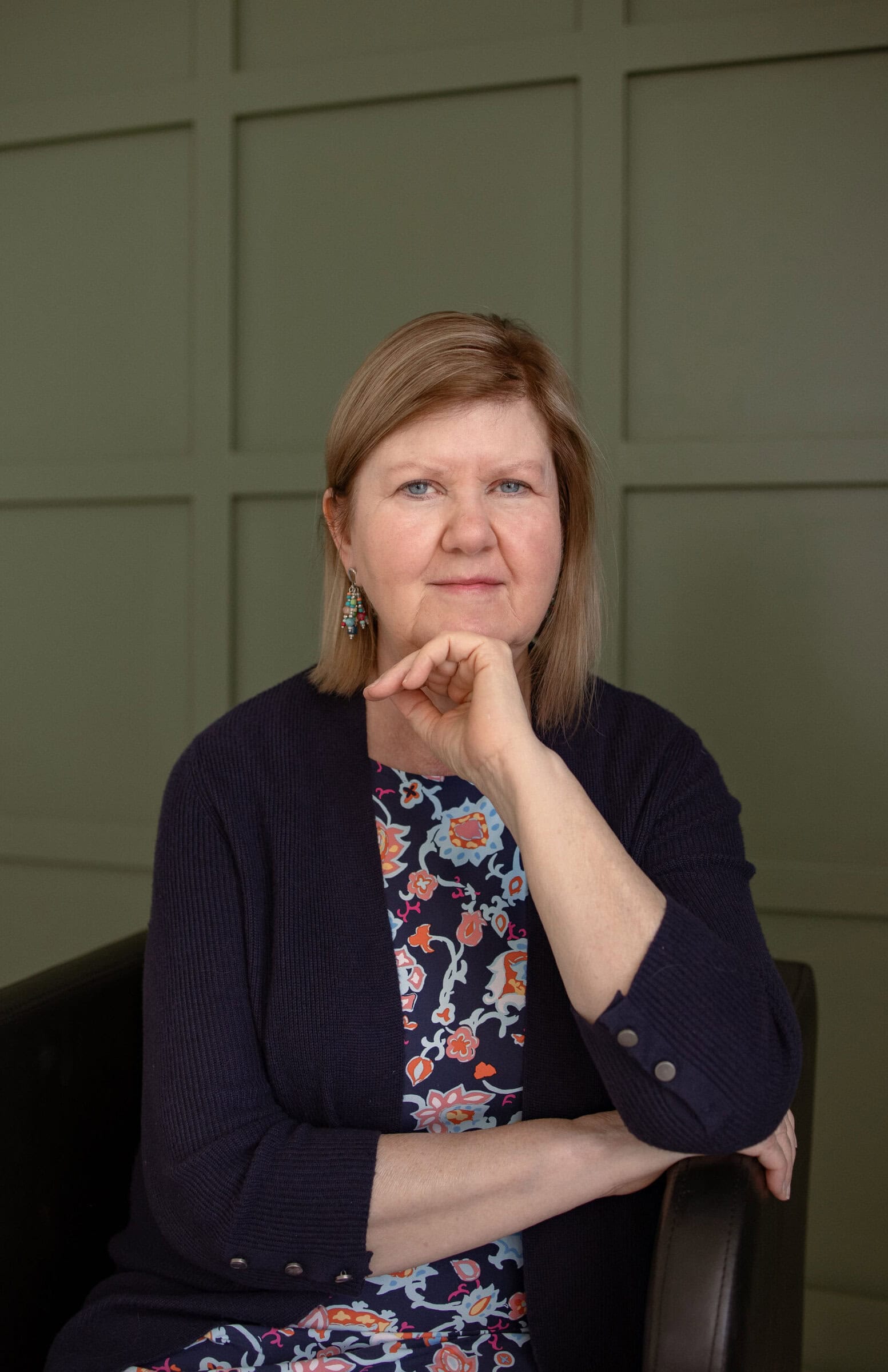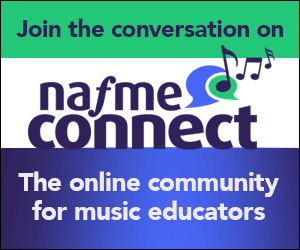
/ Membership / Meet Our Members / Judy Bush
Judy Bush’s Remarks (video) (transcript)
What do you see as the major challenges music education will face during your term and in what ways can you transform these into opportunities during your presidency?
Recruitment and retention of qualified teachers continues to be a challenge and while there are many things that may seem out of our purview, we need to remain connected to teachers in the trenches, understanding the fear, stress, burnout, lack of adequate time and support that they experience.
A current trend towards career and college readiness classes in middle school and late elementary school is shifting parents and students even more towards math, science and technology to fulfill perceived needs in our workforce and away from the arts and humanities. Students are encouraged and sometimes required to participate in these classes, especially marginalized students in the hope of raising graduation rates. I see this as an excellent advocacy opportunity for NAfME to create and provide current research to teachers to share with parents and administration and other stakeholders as to not only the academic/cognitive benefits of music study but also what author Simon Sinek refers to as “human skills”, or soft skills that employers are looking for. These would include listening, patience, empathy, problem solving, how to give and receive feedback, teamwork, work ethic and self motivation, leadership, resilience, adaptability and building relationships.
What do you see as the major challenges the association will face during your term and in what ways can you transform these into opportunities during your presidency?
The major challenge I see with NAfME is relevancy. Gone are the days when you joined your collegiate chapter followed by your active membership as a new teacher because it was the professional thing to do. As of several years ago, national K-12 conferences are a thing of the past due to cost. Music teachers are getting practical knowledge and skills from their state and area specific conferences where they have built relationships. Joining NAfME just so students can participate in their all-state is a sad reason to join and states are figuring out that they can provide these experiences to their teachers and students without belonging to NAfME. While NAfME is providing some great on-line PD, I believe that there are other areas that we can focus on outside of what other entities are currently providing. The NEB needs to brainstorm other services that NAfME can provide and different ways to provide them. As leadership we need to find ways to build real relationships in order for members to feel they “belong” and not just because they paid their dues.
How do you plan to advance equity/DEIA in NAfME during your term of office?
First, I will continue my personal journey through listening and learning and I will encourage colleagues to do the same. Secondly. I will ask the NEB to look into various aspects of the organization including elections and appointments to see if there are actions we can take that will encourage a more diverse group of music educators to participate in terms of leadership, professional learning, and specific career choices. Next, we should continue conversations with higher ed to see what can be done to accept diverse students with less conventional backgrounds into our music education programs. I would also look into our DEIA committee to see how we can streamline processes and perhaps create a way for the committee to educate the NEB, societies, councils and committees so DEIA becomes a part of our culture.
Leadership Statement
Leadership is a journey, a learned skill, a calling. It can be an untapped resource until it is recognized by someone who sees it in you, or through passion for a cause. There are those who believe you are either born to be a leader or you are not. I believe there is a leader in all of us, and whether we are a natural or not, everyone can learn to become a better leader.
Many servant leaders have made an impact on my leadership journey, and I have learned that a great leader does more listening than talking and walks alongside those they lead, not ahead. A servant leader helps others to see their gifts and talents and encourages them to use those for others.
I have also learned that great leaders must have uncomfortable, sometimes very difficult conversations, taking time to just listen and then ask questions to learn more about the person or situation at the heart of those conversations. Leaders cannot possibly know everything, so wise leaders surround themselves with people who are not afraid to speak truth, even when it is difficult to hear. Leaders who purposefully surround themselves with people who think differently than they do allows them to see situations through different lenses, which in turn allows them to make better informed choices/decisions.
Leadership happens at every level, from within your family, at your place of work or worship, at a local, state or national level. The characteristics of a good leader are always the same, no matter level or place. Leaders are those who not only work on doing the big things right, but also take the time to do the little things right first. Leaders are not perfect by any means, but strive to work with integrity, thinking of others first, being accountable and doing their best to rectify a situation when needed.
Personally, I have learned that being an introvert does not mean I cannot be a great leader. I have been a quiet woman fortunate enough to have people around me who spoke truth, who encouraged, and who saw leadership qualities that I did not see in myself. I continue to learn from great leaders and work to model leadership for others. Like the art of teaching, leadership does no good if you keep it to yourself. It is only powerful when you pay it forward.
Equity Statement
As an elementary general music teacher, there were many times when the students and sometimes even their parents would complain that something wasn’t fair because not everyone got the same opportunity. My response was that not all kids are the same, so my job was to give each child what they needed to be successful to the best of my ability.
People do not start on an even playing field. There is not one of us who has exactly the same life experience, even within our own families. Individuals may need different things to succeed. And while the “American Dream” can be a reality, it needs people who are willing to provide opportunities to create equality. I believe it also needs people to go that step further and develop relationships with people different from themselves to understand the need to create equity.
In our country, we tend to believe that all people have the same opportunities. That may be true, but I believe equity goes beyond opportunity. Opportunity is merely one piece of the puzzle. Let’s take a simple job interview, for instance. I may look great on paper, have the same qualifications for the job as others interviewing, but my opportunity is increased when I have developed a relationship with someone who knows me and who can advocate for me because they care for and are invested in me.
It is easy to throw money at a situation to give a finite group of people a temporary solution. I can even develop a step by step Program that will help some people succeed. But I believe equity can thrive and survive only when one person gets to know another person on a deeper level, asking about their lived experiences, listening without thinking how they want to respond, and working to understand how they can help where needed.
I believe we are born without bias, but as we live our lives and are surrounded by others, we become biased out of ignorance or fear, many times influenced by the community around us. That is why I also believe that real connection and building relationships with people from many walks of life is so important. It is only when we can see life through another’s eyes that we can see a lack of equity and work to do something about it – it’s taking the time to learn the “why”.
In music education today, I believe we have created some great programs at every level that benefit certain students because they fit the criteria for the program. However, when the student does not fit the program and someone is not willing or able to modify or expand that program to include them, we cannot say we are being equitable. It is not about eliminating what we currently have to include something new, it is pulling another chair to the table, adding a leaf and including them in the conversation. I am not saying that working towards equity is easy – nothing worthwhile is easy, but I believe music educators are creative enough to make equity through music a reality for all students if they are willing to have the hard conversations, discover the “whys” and develop real relationships.


